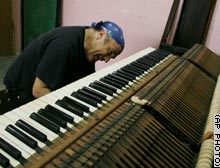
U.S. piano tuner hits right notes in Cuba
HAVANA, Cuba (AP) -- When American piano tuner Benjamin Treuhaft first visited Cuba in 1993 he found that years of neglect, humidity and termites were ravaging the island's dwindling piano population.
Thirteen years on, Treuhaft has helped send 237 old pianos donated by Americans to the communist-run island, filling a void in a musical country by providing instruments used for practicing piano concertos, accompanying tenor soloists and rehearsing ballet dancers.
"Most of the pianos here were Soviet-made: many of them from Moscow and Estonia, so they weren't that great to begin with," Treuhaft said during a visit this week. "Then, they met the Cuban termites. And then, they met the Cuban pianists, who are great, but strong, and can really destroy an instrument."
Treuhaft keeps returning to survey donated instruments and tune and restore others, striking an insistent chord against the U.S. trade embargo.
After nearly 20 trips to the island -- some without U.S. approval -- the jocular former hippie who sports a bandanna on his head and likes to tune pianos barefoot is now a personality in some Cuban music circles.
When Treuhaft repaired Jorge Lopez Marin's dilapidated Russian piano, the Havana composer wrote a traditional Cuban song for him called "El Medico de Piano" -- or "The Piano Doctor." The tune is widely performed by a popular women's musical group.
"What he has done is very important for the music community in Cuba," said Julia Diaz, a Cuban piano tuner who has known Treuhaft for 12 years. "He is very much beloved here."
Cubans admire Treuhaft's dedication to his craft, and delight in his playful personality.
"I'm on vacation," Treuhaft insisted, clad in black jeans and a T-shirt, and scrunched up under an old American baby grand at Havana's Superior Art Institute. "I still might get to go to the beach if they'd stop finding pianos for me."
Treuhaft, who was returning to the United States on Friday, said he has U.S. Treasury Department approval to visit Cuba legally to check on the donated pianos. He said he exported the donated instruments with approval of the U.S. Commerce Department, which curiously granted a license through its the Office of Missile and Nuclear Technology.
But for this trip, he said, "I left my license at home."
Treuhaft said he isn't worried about the possibility of being fined for his latest trip to Cuba, which he described as an "act of civil disobedience" against American rules he says violate his constitutional right to travel.
Treuhaft was contacted by Treasury officials after an unauthorized visit in 1994. Treuhaft was fined $10,000, later dropped to $3,500, which he refused to pay. The case remains open.
Treasury Department spokeswoman Molly Millerwise declined to comment on Treuhaft's case because of privacy issues.
Although Treuhaft doesn't consider himself political, he said his defiance of the U.S. embargo may be explained by his background.
The 58-year-old was raised in the San Francisco Bay Area by activist parents who were Communist Party members in the 1950s.
His mother was noted social critic Jessica Mitford, whose book "The American Way of Death" criticized the funeral industry. His father was Oakland, California, civil rights attorney Richard Treuhaft.
Treuhaft said his parents, who died in recent years, loved his "Send a Piana to Havana" project, its name written in American vernacular to make it rhyme. "They would make their leftist friends donate thousands of dollars," he recalled.
Treuhaft now has a young Hungarian wife and a baby daughter. For this trip, they stayed in New York, where Treuhaft now operates his Underwater Piano Shop in the East Village.
The shop, which Treuhaft ran in Berkeley, California, for 25 years, was named for a whimsical idea he had as a hippie in the 1960s about an underwater piano to entertain dolphins. The plan was never realized.
During those years, Treuhaft found his calling when he wandered into a San Francisco music shop owned by Victor Charles, a Canadian Marxist and piano tuner.
Charles taught the 18-year-old college dropout how to handle a tuning fork -- a craft Treuhaft perfected in the 1970s at the prestigious Steinway & Sons Concert Basement in New York, working for artists including Vladmir Horowitz.
When Charles died in the early 1990s, he left Treuhaft $28,000, which helped pay for an early shipment of donated pianos. With increased sanctions on Cuba in recent years, Treuhaft said he's temporarily put more shipments on hold.
But he said he'll still visit Cuba -- with or without his government's approval. And he hopes to work with Cuba in a joint enterprise using the island's copper to manufacture piano bass strings to be sold across Latin America.
The company's name?
The Helms-Treuhaft Piano Bass String Co., named after retired U.S. Sen. Jesse Helms, R-North Carolina, who co-sponsored a major law tightening the American embargo a decade ago.
Copyright 2006 The Associated Press. All rights reserved.This material may not be published, broadcast, rewritten, or redistributed.
No comments:
Post a Comment